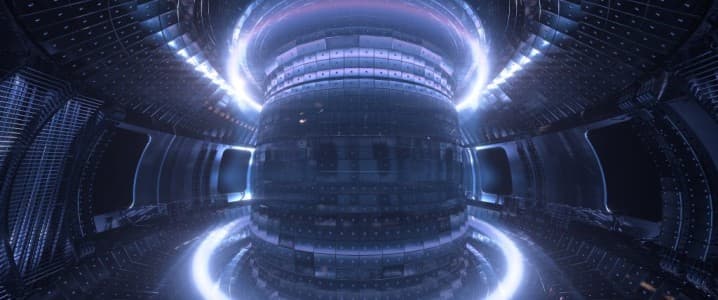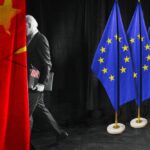Summary by Geopolist | Istanbul Center for Geopolitics:
The article from OilPrice discusses China’s recent advancements in nuclear fusion technology and its implications for the global energy landscape. Here’s a summary:
Key Points:
1. China’s Breakthrough in Nuclear Fusion:
- First-Mover Advantage: China has achieved a significant milestone in nuclear fusion technology, positioning itself as a leader in this field. The country’s advancements could give it a competitive edge in developing a sustainable and revolutionary energy source.
2. Recent Achievements:
- Progress in Technology: Chinese researchers have made notable progress with their experimental fusion reactors, including the successful operation of their EAST (Experimental Advanced Superconducting Tokamak) and the recent achievement of high-temperature plasma conditions.
3. Implications for Global Energy:
- Potential Impact: If China continues to advance in nuclear fusion, it could significantly impact the global energy market by providing a cleaner, more efficient energy source compared to traditional fossil fuels and even current nuclear fission technologies.
4. Challenges and Competition:
- Ongoing Challenges: Despite the progress, nuclear fusion faces numerous technical and financial challenges, including maintaining stable reactions and achieving energy output that exceeds input energy.
- Global Competition: Other countries, including the U.S. and members of the European Union, are also heavily investing in fusion research. China’s advancements could spur more competition and collaboration in the pursuit of viable fusion energy.
5. Strategic and Economic Considerations:
- Strategic Advantage: China’s early lead in fusion technology could enhance its geopolitical influence and economic power by becoming a key player in the future energy market.
In summary, China’s recent success in nuclear fusion research marks a significant step forward, potentially giving it a first-mover advantage in the global energy sector. This advancement could reshape energy markets and geopolitical dynamics, though challenges remain in achieving practical and widespread fusion energy use.
For more details, read the full article here below.
It’s been seven decades ever since scientists started working on nuclear fusion technology, with the allure of almost limitless clean energy proving too powerful to resist. Unfortunately, milestones have fallen time and again, giving rise to the running joke that a practical nuclear fusion power plant could be decades, if not centuries, away.
For nearly two decades, the world’s hopes of building a practical nuclear fusion plant have rested on France-based International Thermonuclear Experimental Reactor (ITER), funded and run by seven member countries since 2006. Like many nuclear power projects, ITER has come under scrutiny for repeated delays and massive cost overruns. Indeed, Charles Seife, director of the Arthur L. Carter Institute of Journalism at New York University, recently sued ITER for lack of transparency.
According to Seife, ITER project costs have surpassed €20 billion ($21.8 billion), more than four times the original budget of €5 billion (then $5.5 billion) and nearly a decade late from its 2016 delivery date.
Now, however, the fusion sector might finally have something to show to the world for all its troubles thanks to a major milestone by a Chinese startup. Shanghai-based Energy Singularity has effectively completed the engineering feasibility verification of high-temperature superconducting for its Honghuang 70 (HH70) tokamak device, giving China a first-mover advantage in the critical field of high-temperature superconducting magnetic confinement fusion. Energy Singularity has also become the world’s first commercial company to build and operate an all-superconducting tokamak.
Related: Russia’s Novatek Slashes Gas Output at Sanctioned Arctic LNG 2
“The design work of the device began in March 2022, and the overall installation was completed by the end of February this year, setting the fastest record for the research and construction of superconducting tokamak devices worldwide,” Yang Zhao, Energy Singularity’s Chief Executive Officer, has revealed.
So, how did this little-known Chinese company manage to pull off in two years what ITER has failed to achieve in nearly two decades?
According to Yang, using high-temperature superconducting materials can reduce the volume of a device to about 2 percent of that of traditional low-temperature superconducting devices, allowing the construction period of the device to be shortened from ~ 30 years to just 3-4 years.
According to Yang, the company owns independent intellectual property rights of HH70, with a domestication rate of over 96 percent, adding that all of the device’s magnet systems are constructed using high-temperature superconducting materials. Despite its commendable success, Energy Singularity is not resting on its laurels, with Yang revealing the company plans to complete the next generation high magnetic field high-temperature superconducting tokamak device dubbed HH170 with a deuterium-tritium equivalent energy gain (Q) greater than 10 by 2027. In fusion parlance, the Q value reflects the energy efficiency of the fusion reactor, that is, the ratio of the energy generated by the device to the energy input required to sustain the fusion reaction. Q values greater than 1 means the reactor generates more energy than what it consumes, which is essentially what fusion research has been trying to achieve in a commercial reactor for decades. Currently, the greatest Q factor that scientists have achieved is just 1.53.
Small Reactor Design
Energy Singularity is not the only fusion startup that’s pursuing small reactor designs. Deven, Massachusetts-based Commonwealth Fusion Systems is collaborating with MIT to build their small fusion reactor. Dubbed Sparc, the reactor is ~1/65th the volume of ITER’s reactor. The experimental reactor is expected to generate about 100 MW of heat energy in pulses of about 10 seconds – bursts big enough to power a small city.
That said, small reactors are hardly unique to the nuclear fusion sector. The Biden administration has been a strong proponent of Small Modular Reactors (SMR) that have been making the waves in the nuclear fission space.
Three years ago, U.S. Nuclear Regulatory Commission (NRC)8 approved Centrus Energy Corp.’s (NYSE:LEU) request to make High Assay Low-Enriched Uranium (HALEU) at its enrichment facility in Piketon, Ohio, becoming the first company in the western world outside Russia to do so. Applications for HALEU are currently limited to research reactors and medical isotope production; however, HALEU will be needed for more than half of the SMRs currently in development across the globe. HALEU is only currently available from TENEX, a Rosatom subsidiary.
Last November, Centrus Energy announced that it had made its first delivery of 20 kilograms of HALEU UF6 to the DoE, completing Phase One of its contract. The company managed to complete the first phase under budget and ahead of schedule. Centrus will now immediately proceed to Phase Two of the contract–requiring HALEU production at the rate of 900 kilograms per year.
In January, the DoE issued a request for proposals (RFP) for uranium enrichment services to help establish a reliable domestic supply of fuels using HALEU. The Inflation Reduction Act (IRA) will provide up to $500 million for HALEU enrichment contracts selected through this RFP.
By Alex Kimani for Oilprice.com
Source: Oil Price







